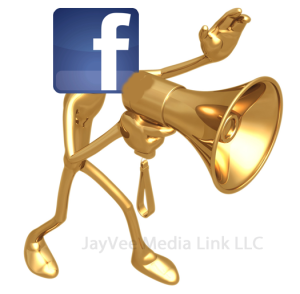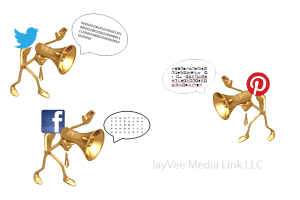by Jeanine Vecchiarelli return to JayVee Media Link LLC
Social media is an important channel for marketing goods and services, more now than ever before. But using the “tools” of this channel for business requires knowledge and understanding of each platform and how to best employ it. Too many would-be online marketers do not grasp the “pull” nature of social media marketing. Equally importantly, they fail to comprehend the nuances of each platform they wish to use.
 One concept I’d like to address in this post is the fact that each social media platform has its own “voice.” Each one serves a different overall purpose, and hence each is different in the way users engage. Let’s look at the two most popular channels: Twitter and Facebook. Twitter is a great platform for making connections. Communication is vital, but it is necessarily concise since tweets are encapsulated by that 140 character limit. Because everything is so “quick hit,” the action moves very swiftly on Twitter. There are forums where good discussions take place, such as hashtagged conversations. But these conversations move very quickly because of the brevity of the verbal exchanges.
One concept I’d like to address in this post is the fact that each social media platform has its own “voice.” Each one serves a different overall purpose, and hence each is different in the way users engage. Let’s look at the two most popular channels: Twitter and Facebook. Twitter is a great platform for making connections. Communication is vital, but it is necessarily concise since tweets are encapsulated by that 140 character limit. Because everything is so “quick hit,” the action moves very swiftly on Twitter. There are forums where good discussions take place, such as hashtagged conversations. But these conversations move very quickly because of the brevity of the verbal exchanges.
 Facebook, on the other hand, is really good for solidifying connections and building relationships. It is the tool by which we engage more in depth with our fans and our peers; we service our clients, ask and answer more detailed questions, and really allow our brands’ human side to show. Because of this activity, Facebook posts tend to be longer and more descriptive. The pace seems almost leisurely by comparison.
Facebook, on the other hand, is really good for solidifying connections and building relationships. It is the tool by which we engage more in depth with our fans and our peers; we service our clients, ask and answer more detailed questions, and really allow our brands’ human side to show. Because of this activity, Facebook posts tend to be longer and more descriptive. The pace seems almost leisurely by comparison.
Other social media platforms have their own personalities and functions too. LinkedIn maintains a more professional demeanor. Though not entirely, it is primarily a business to business platform. The interaction there is more formal than we see on Facebook or Twitter. Google+ is somewhere in the middle: less formal than LinkedIn, but not as casual as Facebook or Twitter. Google+ is also good for B2B, though it’s not as dedicated to that arena as LinkedIn.
When marketers juggle multiple social media platforms, cross posting is considered a great time saver. There are some limited situations where the practice may work, but it should never be abused. Twitter folk often dislike seeing posts from Facebook. The whole style of posting to Facebook doesn’t fit in a Twitter environment. Conversely, Facebook users don’t take to tweets showing up on timelines – ESPECIALLY when they contain hashtags! Posts on most other platforms aren’t compatible with the style of verbal exchange on LinkedIn. Ultimately, it is important to realize that cross posting may save some time on the front end, but it may cost us fans and followers in the long run. The best approach is to become familiar with each platform’s unique voice, and learn to use each appropriately when sharing our value.
Which social media platform “lingo” do YOU speak best? Please share your thoughts in the comments section below!

Pingback: Blog Post Assignment #2 « IndieRaps
Thank you for referencing my blog in your own post! I hope the information I provided is helpful to your readers!